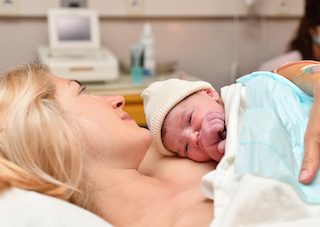 According to the recent study, Mother and Baby Units Matter: Improved Outcomes for Both, published in BJPsych Open, mothers admitted to Mother and Baby Units (MBUs) with postpartum depression show improvement over admission.
According to the recent study, Mother and Baby Units Matter: Improved Outcomes for Both, published in BJPsych Open, mothers admitted to Mother and Baby Units (MBUs) with postpartum depression show improvement over admission.
Up to 20 per cent of women experience postpartum depression or another maternal mental illness following birth. MBUs are considered the gold standard for in-patient care of women with severe mental illness. They are overnight psychiatric facilities that cater to the needs of mothers and their babies. MBUs provide maternal mental health specialists and some even provide yoga and art therapy. Mothers can be admitted to an MBU in pregnancy or following the birth of the baby up to 12 months.
Though they’ve existed in Europe for decades, the first, daytime-only, MBU in the United States opened in 2011 and none currently exist in Canada. There are 17 MBUs in the United Kingdom and four more have been commissioned in areas of the country where there is limited access for women.
The current study looked at outcome measures on one MBU in England - the Channi Kumar Mother and Baby Unit at the Bethlem Royal Hospital, South London and Maudsley NHS Trust. The measures taken on admission to the MBU and on discharge were from the Brief Psychiatric Rating Scale (BPRS) where the clinician rates the symptoms of the mothers' mental health; the HoNOS, the Health of the Nation Outcomes Scale, 12 scales to measure the health and social functioning of people with severe mental illness; and the CARE-Index that describes the dyadic synchrony of the relationship between mother and infant from video taped play between the mother and the infant.
In all three measures, the mothers showed improvement over the admission to the MBU.
“There was a significant improvement in the BPRS scores from admission to discharge,” study author Susan Pawlby told us. “This was not a surprise, otherwise the women would not have been discharged - but it did tell us something about the improvement in scores among women with different diagnoses.”
Pawlby explained to us that there was a significant improvement in all the HoNOS scores, apart form living conditions, but that this is not always something that mental health professionals can sort out during admission.
“We do not admit mothers who currently use alcohol or substances and thus this measure is not assessed,” Pawlby told us. “Very strikingly we were very happy to see the positive results in the CSRE-Index showing that not only does the mother have higher sensitivity scores on discharge, but the baby has higher co-operative scores.”
Having worked on the MBU for 16 years, Pawlby and the perinatal consultant psychiatrist she works with recognised the need for a research study showing the outcome for women following their admission to an MBU both in terms of their mental health and everyday functioning, and also in terms of their relationship with their baby.
“The positive results that we found provide evidence for the investment in MBUs,” Pawlby told us. “We are encouraging other MBUs to use the same outcome measures so that we can undertake bigger studies.”
Pawlby says there needs to be evidence that the expense joint admission of mother and baby to an MBU is justified, hence the research study.
“We feel very strongly that the care of the mother with a serious mental illness following childbirth is enhanced by joint admission and now this research paper gives the evidence,” Pawlby told us. “Given that the estimated cost of perinatal mental health for one year's cohort of births is £8.1 billion and that 72 per cent is attributed to the impact of maternal perinatal mental health on the offspring, it is important to minimize these costs by supporting women with serious mental illnesses and their babies (and families) in the very early days and months.”
The British government has given £350 million over a five-year period from 2016 to 2021, to provide specialist perinatal mental health community services and access to MBUs across the country and to prevent admission to an MBU being a ‘postcode lottery’.
Patricia Tomasi is a mom, maternal mental health advocate, journalist, and speaker. She writes regularly for the Huffington Post Canada, focusing primarily on maternal mental health after suffering from severe postpartum anxiety twice. You can find her Huffington Post biography here. Patricia is also a Patient Expert Advisor for the North American-based, Maternal Mental Health Research Collective and is the founder of the online peer support group - Facebook Postpartum Depression & Anxiety Support Group - with over 1500 members worldwide. Blog: www.patriciatomasiblog.wordpress.com
Email: tomasi.patricia@gmail.com